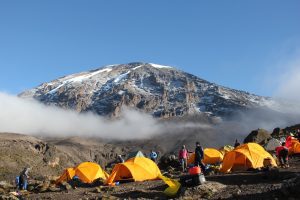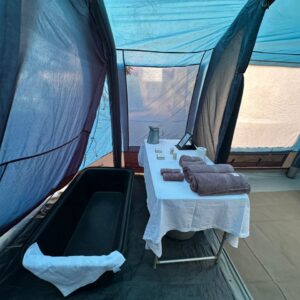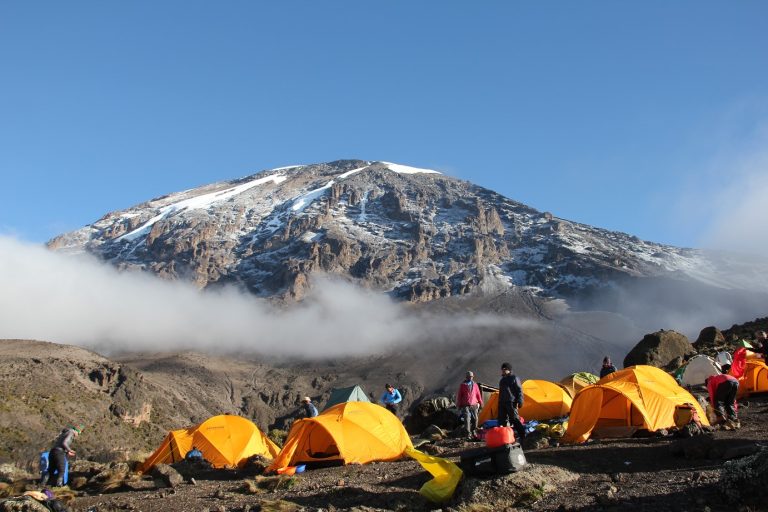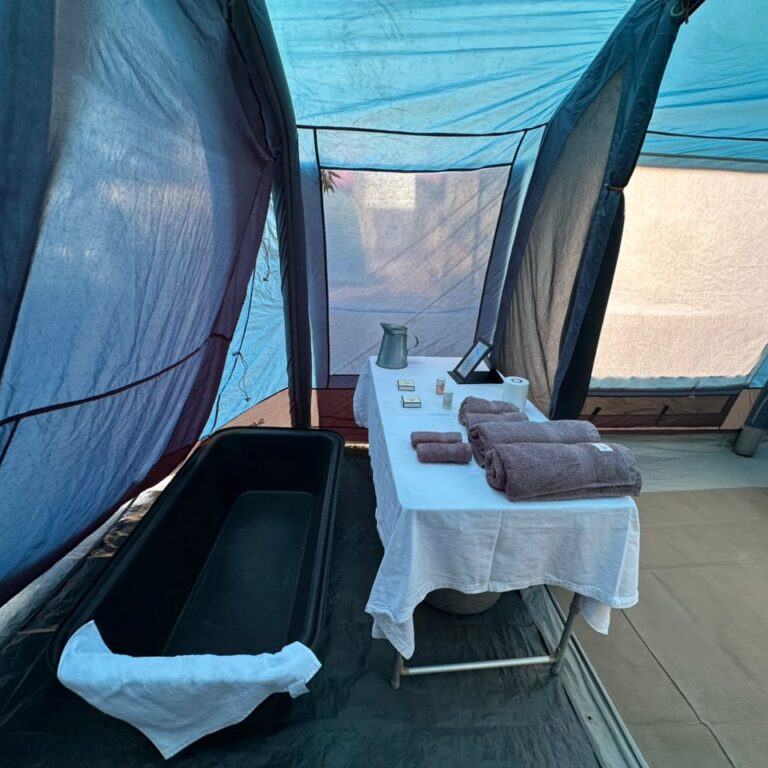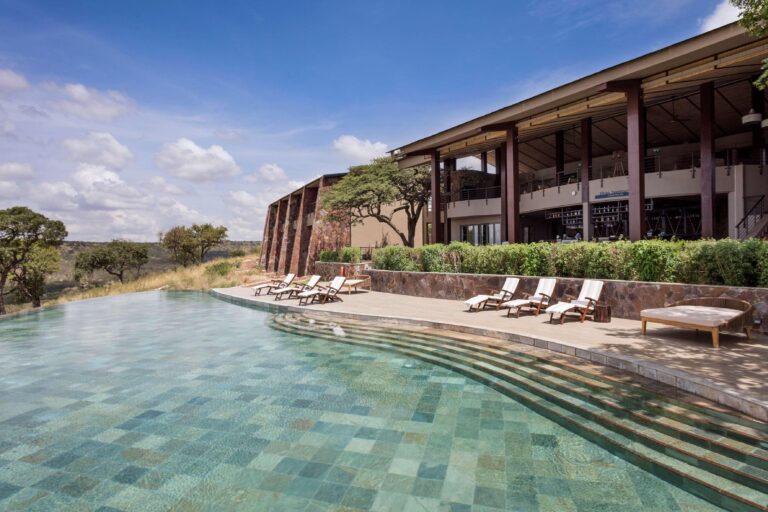Kilimanjaro Porters Extensive Guide & Tips To Climb The Top Of Africa
Kilimanjaro porters are local people of all genders who work as part of a support team for trekkers and climbers on Mount Kilimanjaro in Tanzania. They are responsible for carrying equipment, food, and supplies for the climbers and setting up campsites along the mountain route.
The work of Kilimanjaro porters is physically demanding and requires a high level of fitness and endurance. They often carry loads weighing up to 30 kilograms on their backs while navigating steep and rocky terrain.
How Many Porters Should Climb Kilimanjaro Per One
Despite the challenges they face, many Kilimanjaro porters are passionate about their work and take pride in supporting climbers on their journey to the summit of Mount Kilimanjaro.
It is important to note that the welfare of Kilimanjaro porters is a significant issue, and many of them work under difficult conditions and are paid low wages. As responsible climbers, it is important to support ethical and sustainable climbing practices that prioritize the well-being and fair treatment of porters.
Organizations such as the Kilimanjaro Porters Assistance Project (KPAP) work to promote fair and ethical treatment of Kilimanjaro porters by providing education, training, and advocacy to climbers, trekking companies, and local communities.
Carrying equipment and supplies
What do Kilimanjaro Porters Do? Are responsible for carrying all of the necessary equipment and supplies for climbers, including tents, cooking gear, food, and water. Kilimanjaro Porters – Unsung Heroes Of Your Expedition.
Setting up Campsites
Kilimanjaro porters are the heart and soul of the mountain. Porters set up campsites for climbers along the mountain route. This includes pitching tents, preparing meals, and ensuring that the campsite is clean and safe.
Providing support and motivation
Kilimanjaro Porters – Extensive Guide & Tips To Climb The Top Of Africa. Many porters are also skilled in singing and dancing, and they often provide emotional support and motivation to climbers.
Assisting with emergencies
In the event of an emergency, porters are often the first to respond and provide assistance to climbers.
Maintaining the mountain trails
Porters also help to maintain the mountain trails. By carrying out routine maintenance tasks such as clearing rocks and debris from the path.
It is important to note that Kilimanjaro porters often work under difficult conditions and are paid low wages. As responsible climbers, it is important to support ethical and sustainable climbing practices. Prioritize the well-being and fair treatment of porters. They play a critical role in supporting climbers on their journey to the summit of Mount Kilimanjaro.
Kilimanjaro Porter Weight Limit
The weight limit set by the Kilimanjaro National Park Authority and is designed to ensure the safety and wellbeing of them, as well as the protection of the environment.
The weight limit varies depending on the route taken up Kilimanjaro and the number of days spent on the mountain, but in general, the weight limit for each porter is 20kg (44lbs) for the Marangu and Rongai routes, and 25kg (55lbs) for the Machame. Lemosho. and Umbwe routes.
This weight limit includes the porter’s own personal equipment, such as clothing and sleeping gear. It is important to adhere to the weight limit and to pack only what is necessary for the climb to avoid putting undue strain on the porters and the environment. TripAdvisor Reviews.
how much do Kilimanjaro porters get paid
The payment set by the Kilimanjaro Porters Assistance Project (KPAP). Non-profit organization that works to improve the working conditions and treatment of porters on Kilimanjaro.
As of 2021, the recommended minimum wage is 20,000 Tanzanian shillings per climb (about $9 USD per day). This wage should be paid in addition to food, accommodation, and tips.
It’s important to note that not all companies adhere to the recommended minimum wage and working conditions set by KPAP, and some porters may be paid less than this amount.
Therefore, it is recommended to choose a reputable tour company that follows ethical guidelines and treats its porters fairly. Additionally, it’s a common practice to tip the porters at the end of the climb. This can vary depending on the length of the climb and the number of porters involved. The recommended tip is usually around $10-15 per day per porter.
Kilimanjaro Porters: Playing a Vital Role in Mount Kilimanjaro Climbing – FAQs
Mount Kilimanjaro, the highest peak in Africa, attracts adventurers from around the globe. While climbers often receive well-deserved recognition, it’s essential to shed light on the unsung heroes of these expeditions – the Kilimanjaro porters. These dedicated individuals play a crucial role in making the climb possible.
Who are Kilimanjaro Porters?
Individuals hired to assist climbers during their ascent and descent of Mount Kilimanjaro. They carry essential gear, set up campsites, and provide invaluable support to ensure a safe and enjoyable climbing experience.
What is the Role of Kilimanjaro Porters?
Porters take on various responsibilities, including transporting climbers’ equipment, setting up and dismantling camps, and providing assistance during the climb. Their dedication and hard work contribute significantly to the overall success of the expedition.
How are Kilimanjaro Porters Hired?
Porters are typically hired through licensed trekking companies. These companies are responsible for ensuring fair wages, proper working conditions, and adherence to guidelines set by the Kilimanjaro National Park Authority.
What Challenges do Kilimanjaro Porters Face?
Porters face challenges such as carrying heavy loads at high altitudes, dealing with unpredictable weather conditions, and working long hours. Responsible trekking companies prioritize the well-being of their porters, providing them with appropriate gear, accommodation, and medical support.
What is the Importance of Fair Porter Treatment?
Fair treatment of porters is crucial for the ethical and sustainable practice of climbing Kilimanjaro. Ensuring fair wages, proper working conditions, and ethical treatment contribute to the welfare of the local communities and promote responsible tourism.
How Can Climbers Support Kilimanjaro Porters?
Climbers can support porters by choosing reputable trekking companies that prioritize porter welfare. Additionally, respecting porters, appreciating their hard work, and following responsible trekking practices contribute to a positive climbing experience for everyone involved.

